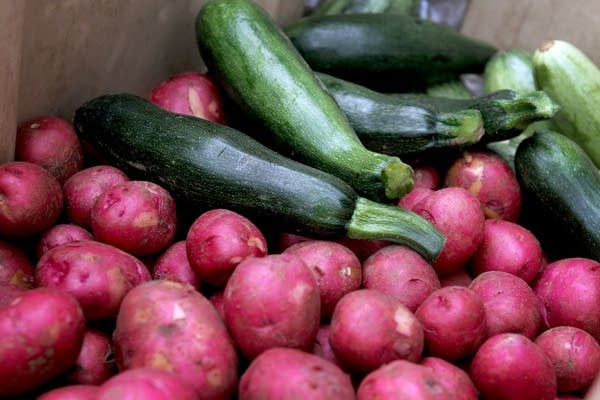Vegetables, tension grow on Hmong-American farm
Go Deeper.
Create an account or log in to save stories.
Like this?
Thanks for liking this story! We have added it to a list of your favorite stories.

A dispute last month in the southern Twin Cities community of Eagan has rattled Hmong-American farmers who grow vegetables near suburban homes.
More than 40 growers sought restraining orders against a nearby resident who police say used a loaded shotgun to threaten a Hmong couple working in the field.
Farmers' advocates say the case is extreme, but it's not uncommon for Asian growers to encounter hostilities as their search for rentable farmland takes them away from urban areas.
The Association for the Advancement of Hmong Women in Minnesota, which helps Hmong farmers find undeveloped land in the suburbs, found the roughly 20 acres in Eagan, and brokered a deal with the landowner.
Turn Up Your Support
MPR News helps you turn down the noise and build shared understanding. Turn up your support for this public resource and keep trusted journalism accessible to all.
Now the rolling fields next to a residential subdivision are brimming with zucchinis, potatoes and gourds. Hmong families rent the land, and sell the crops at Twin Cities farmers markets.
One of those new renters is Bouachao Xiong of Minneapolis, who used to be a farmer in his native Laos. Xiong and his wife were eager to snatch up a piece of the Eagan land after spending several years chasing fields as far away as Duluth.
One night last month, a neighbor whose backyard borders the fields approached Xiong about a fence, made of sticks and string, that Xiong was setting up. Xiong said the man, Richard Schliesing, tried to tear down the fence because it was interfering with his deer feedings.

Xiong pleaded with the man to stop, and said he would ask someone with better English skills to help the next day.
"I say, 'You don't say to me. Tomorrow I will call some person to talk to you,' " Xiong said.
Xiong said that's when the man threatened to kill him and went back into his house. A few minutes later, the man came out with a shotgun and began to load it, Xiong said.
"I think he will kill me," Xiong said.
Police have charged Richard Schliesing with making terroristic threats. According to the criminal complaint, Schliesing had a blood-alcohol content of .088, which is above the legal limit for driving.

Schliesing admitted to police he approached Xiong, but denied making any threats and denied having a gun, according to the complaint. Police later found a 12-gauge shotgun in his house, the complaint said.
Schliesing's attorney said Xiong's race didn't factor into the confrontation.
"It has nothing to do with that," said attorney Paul Rogosheske. "It has to do with all of a sudden, we've got fences up here, and the wildlife isn't coming into our backyard that we've been feeding for the last five years."
Rogosheske says the language barrier between the homeowner and the farmer, however, could have complicated the encounter.
Xiong wonders if some of the white neighbors view him with suspicion because he's Hmong.

"I'm always concerned and don't know how people feel about us here working on the farm," he said.
Xiong said he likes the neighbors, but isn't sure if the neighbors like him.
Ly Vang, executive director of the Association for the Advancement of Hmong Women in Minnesota, thinks the incident was isolated. But she said it's not unusual for Hmong growers working in the outskirts of the Twin Cities to be questioned by neighbors.
Some have yelled at the farmers to get off the property and "go back home," Vang said.
Eagan police and city officials say even if the shotgun incident was rare, they're taking it seriously. Patrol Sgt. Dan Mason now drives though the fields a few times a day, waving and smiling to the farmers.

"I come around and make sure everybody's OK, try to make sure they see the squad car -- and if they see any issues, to stop and talk to us," Mason said.
Mason, who is of Korean descent, says he doesn't think the issue has anything to do with the fact the growers are Asian.
Most Eagan residents seem thrilled to see the Hmong cultivate the few remaining tracts of agricultural land in the city, Eagan officials said. They want residents to know that everyone is welcome.
"To us, if you're a German farmer, a Hmong farmer, or Vietnamese - it really makes no difference," city spokesman Tom Garrison said. "It ties back to land use, and they have every right to be here. All indications so far are they're conducting themselves appropriately."
The Eagan incident may not be race-related. But there can be tension as the Hmong begin to cultivate land far from the cities in which they live, said Susan Stokes, executive director of the Farmers' Legal Action Group. Growers are feeling the pinch as suburban farmland is being transformed to new subdivisions, she said.
"They're doing what they know and love, which is raising food and selling to all of us who enjoy it," Stokes said. "But it's uncomfortable because they're in places where they look different from the people who are there, and they're doing a different activity from the people who live there. They're often stopped and questioned, 'Are you allowed to be here? Do you have a permit to be here?' "
Stokes says the Hmong-American farmers are helping satisfy a growing demand for fresh, locally grown food.
But the hunt for farmland will likely go on for many families. More than 80 Hmong growers were on Ly Vang's waiting list this year for available land. She said that list has now grown to 200.




